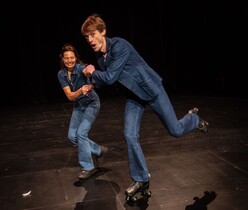Young Europe Blog: The Young Europe Festival will stage two versions of a Cypriot myth
Pig jaws and pancakes
by Alissa Rubinstein
Berlin, May 13th. In just a few short days, participants and audience members at the Young Europe Festival will get their moment with the kalikantzaroi. The Young Europe Festival is coming to the Theater an der Parkaue in Berlin from May 13th through the 16th, accompanied by some seriously smelly goblins from the underworld. Don’t forget your pig jaw!
For Young Europe 2: Multilingual Creation and Education, young people and theater makers from Cyprus, Hungary, the Netherlands, France, Finland and Germany were paired up to develop original pieces exploring themes of multilingualism and diversity as symbols of European identity. Cyprus and Hungary based their pieces on the Cypriot myth of the kalikantzaroi, a particularly nasty breed of Christmas goblins. On May 14th and 15th, the Cyprus Theatre Organization, from Nicosia, will perform Kali-Kantzar & Co in Greek with German and English supertitles, while the Miskolci Nemzeti Szìnhàz, from Miskolc, will relocate the goblins from the Cypriot story to Hungary in a musical called Palinkantzaroi, which will be performed in Hungarian with German and English supertitles.
Smelly, hairy, toad-eating
Both plays use the same kalikantzaroi story as a jumping off point, but if you're anything like me (you're all American Jews of mixed European descent who grew up in a suburb of Los Angeles, right?), Christmas just makes you think of Santa Claus: a jolly fat man in red who hangs out with flying reindeer and sneaks into your house via the chimney with a sack of presents. A western European-based Christmas tradition – or maybe a Coca-Cola marketing ploy. Fun for all ages! Totally harmless!
But wait until you get to Cyprus. What’s that coming down the chimney? Is it jolly old St. Nick, or… a parade of smelly, hairy, toad-eating demons recently arrived from deep below the earth’s surface? Thinking of leaving Santa some cookies and milk, like in America? Maybe you’d better throw some pancakes on the roof instead. Born on December 25th like my little sister Sarah was? If your mother didn’t cover you in garlic as a newborn, you might be a Cypriot goblin. And of course, the best protection against the kalikanztaroi is hanging the lower jaw of a pig in your chimney.
Perfect houseguests
2013 is a celebratory year for fairy tales – 200 years ago, the Grimm Brothers published their first story collection, based on European folk stories. Fairy tales play a large role in cultural identity. We see common characters and tropes in stories from all over the world, and not just because Disney turned lots of them into world famous films.
In fact, there are actually a large number of terrifying mythological creatures scampering about European folk stories. Enter the kalikantzaroi, goblins who live underground but come up to the surface for the twelve days of Christmas. They’re known for being disgusting, smelly and really rather rude; anything they don’t break, they’ll pee on. The perfect houseguests!
But why do we love fairy tales so much? And what kind of hijinks do 21st century kalikantzaroi get up to, anyway? As a blogger for the Young Europe Festival, I’ll be talking to the makers of the Cypriot "Kali-Kantzar & Co" and the Hungarian "Palinkantzaroi" about their play-making process, the role of mythology in defining contemporary European identity and if they think the kalikantzaroi can be redeemed. Questions? Comments? Concerns? You’ll find me in the audience by following your nose: I’ll be the short, curly-haired girl covered in garlic.
Der Blog ist ein Kooperationsprojekt von nachtkritik.de und der European Theatre Convention im Rahmen des Young Europe Festivals. Seine Inhalte sind nicht Teil des redaktionellen Kontents von nachtkritik.de: Impressum.
meldungen >
- 17. April 2024 Autor und Regisseur René Pollesch in Berlin beigesetzt
- 17. April 2024 London: Die Sieger der Olivier Awards 2024
- 17. April 2024 Dresden: Mäzen Bernhard von Loeffelholz verstorben
- 15. April 2024 Würzburg: Intendant Markus Trabusch geht
- 15. April 2024 Französischer Kulturorden für Elfriede Jelinek
- 13. April 2024 Braunschweig: LOT-Theater stellt Betrieb ein
- 13. April 2024 Theater Hagen: Neuer Intendant ernannt
- 12. April 2024 Landesbühnentage 2024 erstmals dezentral








neueste kommentare >